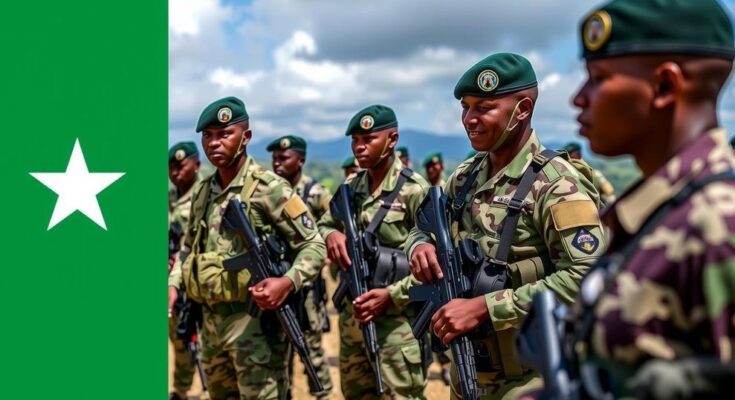The United States is advocating for the transformation of the Kenya-led force in Haiti into a U.N. peacekeeping operation due to rising gang violence. Despite the U.S. push for a Security Council resolution, Russia and China have expressed concerns. Only a fraction of the anticipated police force is currently deployed, and funding issues threaten the mission’s effectiveness. Haiti’s historical context of foreign interventions reveals skepticism about new military involvement.
The United States has intensified efforts to convert the Kenya-led multinational force in Haiti into a United Nations (U.N.) peacekeeping mission. This initiative arises from surging gang violence that recently paralyzed air traffic in Port-au-Prince. In September, the U.S. proposed this transformation to secure steady financing for the U.N.-sanctioned multinational force working to assist Haiti’s national police in combating rampant gang activity amid a significant funding shortfall. In recent weeks, gang attacks have escalated, culminating in clashes following the Haitian transitional council’s decision to dismiss the interim prime minister due to internal political discord. Gangs currently control approximately 85% of Port-au-Prince and disrupted operations at the nation’s primary airport by opening fire on aircraft, injuring a flight attendant. The United States is actively pursuing a U.N. Security Council resolution to facilitate this transition and has urged the U.N. Secretary-General, Antonio Guterres, to initiate the necessary planning and contingency measures for the transformation. However, Russia and China, expressing reservations, have not endorsed the draft resolution. Following a U.N. briefing request from Russia, the council is set to convene discussions on the situation in Haiti. There was an expected deployment of 2,500 international police; however, only about 430 officers are presently on the ground, primarily from Kenya and a few from Caribbean nations. Kenya’s President, William Ruto, mentioned plans to dispatch an additional 600 troops in November. Unfortunately, the funding situation for the trust representing the multinational force remains precarious, with only a fraction of the necessary contributions secured. The arrival of the Kenyan force in June marked the latest major international military effort in Haiti, which has a long history of foreign interventions, particularly amid political instability and violence following the assassination of President Jovenel Moïse in 2021.
The crisis in Haiti stems from a significant increase in gang-related violence and political instability, which has escalated subsequent to the 2021 assassination of the country’s president. These gangs have exploited the vacuum of power, pushing Haitian authorities to seek international assistance. Historically, Haiti has experienced multiple foreign military interventions, mainly from the U.S. and U.N., fraught with controversies such as allegations of misconduct and public health crises. The current proposed U.N. peacekeeping mission aims to stabilize the region and assist in the restoration of democratic governance, but faces complications related to funding and geopolitical concerns, specifically from Russia and China.
In summary, the United States is leading efforts to transition the Kenya-led multinational force into a U.N. peacekeeping mission amid escalating violence in Haiti. This transition is critical for securing ongoing support and resources for stabilizing Haiti, where gang control poses severe challenges to law and order. The situation remains fluid, as discussions and negotiations continue, particularly regarding concerns from other Security Council members about the efficacy and implications of a new U.N. mission.
Original Source: www.usnews.com




